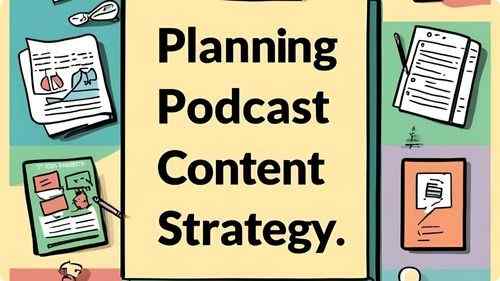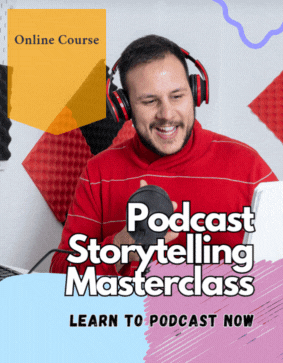Starting a Podcast: Where to start?
216,102 View
Share this Video
- Publish Date:
- May 18, 2025
- Category:
- Learn to Podcast
- Video License
- Standard License
- Imported From:
- Youtube
Tags
Podcasting is a great way to share your knowledge and expertise, but where do you start? 🤔
Pat Flynn has some tips on how to start your podcasting journey:
1. Understand and figure out what your show is all about.
2. How can you describe your show to others?
3. Figure what title fits your show.
4. Start recording your episodes.
5. Plan your content ahead.
6. Make sure your content is share-worthy.
Watch the full video here: https://youtu.be/o7-3awzgPIo
===========================================
Subscribe here for new #shorts:
https://www.youtube.com/c/Buzzsprout
Like, comment, and subscribe for more content on how to start your podcast!
===========================================
We're also on:
Instagram: https://www.instagram.com/buzzsprout/
Twitter: https://twitter.com/buzzsprout
Facebook: https://www.facebook.com/groups/BuzzsproutCommunity
TikTok: https://www.tiktok.com/@buzzsprout
-----------------------------------------
Real Fast Podcast into Best Selling Kindle Books Easily
Ever thought about turning your podcast content into profitable Kindle books without having to write a single word? This course is for you!
In the Real Fast Podcast into Best Selling Kindle Books Easily course, you’ll discover how to:
✅ Create and publish a unique Kindle book in under 3 hours — without writing a single word
✅ Use simple tools to generate book content fast
✅ Outsource book covers for just $5 that look like a professional designer did them
✅ Build a passive income catalog of Kindle books with ease
✅ Publish your first Kindle book by the end of the week
No writing skills? No problem! This method works especially well if you hate writing or just want a quick way to publish your podcast content as a book.
👉 Click here to enroll now and get your podcast turned into a Kindle bestseller today!
Start building your passive income stream now — it’s easier than you think! 📖
2 Must-Know Podcasting Tips for Your Show
Planning Your Podcast Content Strategy

A well-defined content strategy ensures that your podcast remains focused, relevant, and engaging over time. Start by identifying your target audience and understanding their interests, preferences, and challenges. Develop a content calendar that outlines episode topics, guest appearances, and key themes you wish to explore each month. Balance evergreen content that remains relevant over time with timely topics that address current trends or events in your industry. Incorporate a mix of formats, such as interviews, solo episodes, and panel discussions, to keep your content varied and appealing. Regularly review and adjust your strategy based on listener feedback and performance metrics to maintain the effectiveness and appeal of your podcast.
Leveraging Guest Appearances to Grow Your Audience

Featuring guests on your podcast can significantly expand your reach and attract new listeners. Select guests who are experts in your niche or have a substantial following that aligns with your target audience. Prepare thoughtful questions that allow your guests to share valuable insights and experiences, providing rich content for your listeners. Promote episodes with notable guests across both your and your guests’ networks, tapping into their audience base. Encourage guests to share the episode with their followers, increasing your podcast’s visibility. Collaborative episodes not only enhance the quality of your content but also foster relationships within your industry, contributing to your podcast’s growth and credibility.
Frequently Asked Questions
What software is best for recording and editing podcasts?
Popular options include Audacity, which is free and user-friendly, and Adobe Audition, which provides advanced editing features. Choose software that fits your skill level and editing needs.
How can I collaborate with other podcasters?
Partner on joint episodes, guest on each other's shows, share resources, and promote each other's content. Collaboration expands your network and introduces your podcast to new audiences.
What are the common mistakes to avoid in podcasting?
Avoid inconsistent publishing schedules, poor audio quality, lack of preparation, overlong episodes, and neglecting audience engagement. Maintaining professionalism is essential for growth.
What is a podcast hosting service and why do I need one?
A podcast hosting service stores your audio files and distributes them to various platforms. It provides essential analytics, ensures reliable delivery, and often offers tools for monetization and audience engagement.
Statistics
- Podcasts with eye-catching cover art are 45% more likely to attract new listeners.
- Listener reviews and ratings contribute to a 25% increase in podcast discoverability.
- Investing in professional editing services can enhance the overall quality of a podcast, leading to a 30% increase in positive feedback.
- Listeners prefer podcast episodes that range between 30 to 45 minutes, with 65% favoring this duration.
- Collaborating with other podcasters can lead to a 20% growth in listener base.
- Genres such as true crime, technology, and personal development are among the most popular, attracting over 70% of listeners.
- Podcasts promoting their episodes on social media platforms see a 40% boost in new subscribers.
- Podcasts that include detailed show notes experience a 50% increase in listener engagement.
- Podcasts utilizing video snippets on social media experience a 20% rise in audience interaction.
- Podcasts with consistent weekly releases are 60% more likely to grow their audience steadily.
- Podcasts that regularly update their equipment report a 40% improvement in audio quality and listener satisfaction.
- Podcasts that utilize analytics to refine content strategies experience a 40% improvement in listener satisfaction.
- On average, podcasters spend about 10 hours per episode from planning to publishing.
- Using transcription services can make podcasts accessible to a wider audience, increasing reach by up to 25%.
- About 55% of podcasters use interviews as a key strategy to provide diverse content.
- Approximately 40% of podcasters use background music to enhance the listening experience.
External Links
transistor.fm
podcastpage.io
jeffbullas.com
screencast-o-matic.com
zoom.us
podcasters.spotify.com
podcastcareers.com
radiopublic.com
convinceandconvert.com
ahrefs.com
thepodcasthost.com
apple.com
shutterstock.com
listennotes.com
blog.libsyn.com
adobe.com
buzzsprout.com
How To
How To Edit Your Podcast for Optimal Sound Quality
Editing is crucial for producing a polished podcast. Start by using reliable editing software like Audacity or Adobe Audition. Begin with removing any unwanted noise, such as background hums or clicks, to create a clean audio base. Next, trim any long pauses, mistakes, or off-topic sections to maintain a steady pace. Adjust the volume levels to ensure consistent sound throughout the episode. Apply compression to balance the audio dynamics and equalization to enhance clarity. Adding subtle effects, like reverb, can improve the overall sound. Finally, export your edited podcast in a high-quality format to ensure the best listening experience for your audience.













